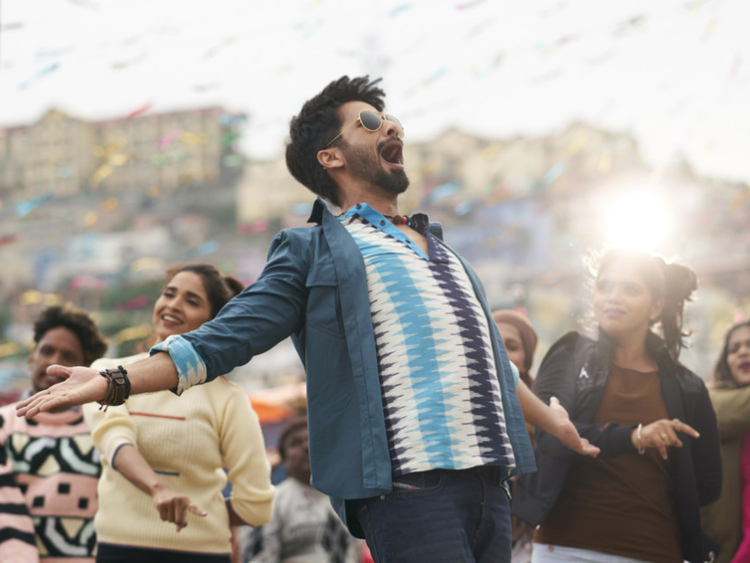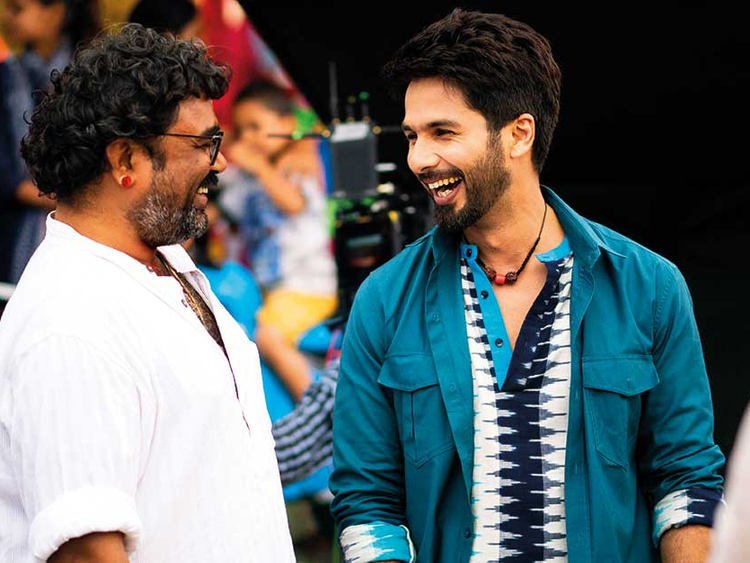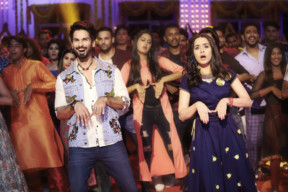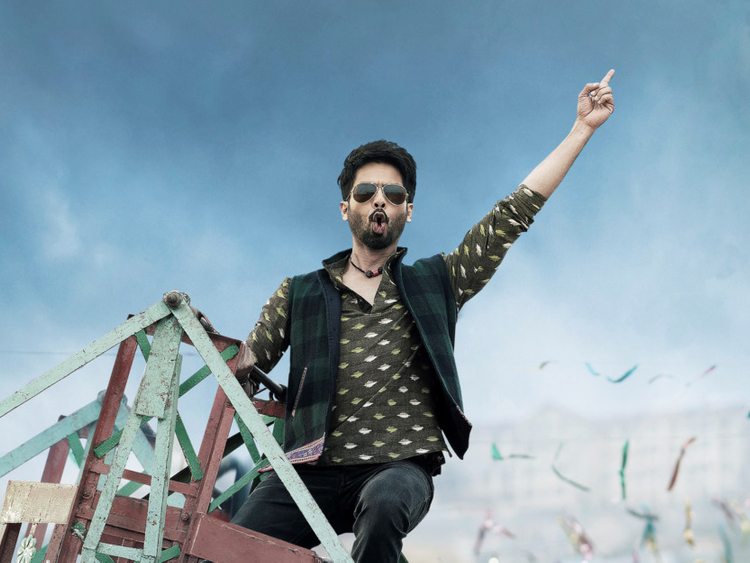
Indian actor Shahid Kapoor is a rebel with a cause in his new film Batti Gul Meter Chalu, out in the UAE on September 20.
The award-winning actor lends his electrifying star power to a film that deals with electricity theft, power outages, inflated electricity bills and faulty meters that cripple the common man in India.
Set in the electricity-starved Uttarakhand in Northern India, Kapoor plays a smarmy lawyer Sushil Kumar Pant with a skewed moral compass.
It’s a career-defining role for Kapoor, who was on call to be uncouth and de-glam.
Batti Gul, directed by Sree Narayan Singh of Toilet: Ek Prem Katha fame, didn’t require him to be shirtless or attempt complex dance moves. Point it out to the actor and he goes: “I am so glad you noticed.”
The new father, who welcomed his second child Zain on September 5, was en route to a press junket in India when he took our overseas call in his car. He wasn’t willing to let our snarky observation slide.
“Are you suggesting that just my body is glamorous and I have little else going otherwise?” asked Kapoor, who seemed to be deriving great pleasure in pulling at that thread.
“But seriously, I am so happy that you noticed that this character isn’t your run-of-the-mill, good-looking hero who is well-spoken, says all the right things that make you think he’s perfect for a woman. Honestly, I lost interest in such roles five years ago and I grew out of it,” he said.
Kapoor’s career trajectory has always been upwards, with the actor choosing interesting roles such as a drug-addled rocker in Udta Punjab to a stoic Rajput king in Padmaavat. It stands as proof that he is open to experimentation.
The son of actor Pankaj Kapur and Neelima Azeem, who began his career as Bollywood’s go-to guy for suave romantic roles, is on the road to re-invention.
“As an actor, it is important that we don’t get defined by such narrow parameters. What makes you a true artist is to play characters that aren’t in your personality or your reality… Today, a large part of our audiences are evolved and want more. They crave for films that engage and move them,” Kapoor said.
Enter his labour of love, Batti Gul Meter Chalu featuring Shraddha Kapoor, Divyendu Sharma and Yami Gautam, where he had to unlearn being charming and articulate.
“None of these appealing traits exist in my character. Sunil’s a quirky self-absorbed lawyer. He’s rough around the edges. Perhaps, viewers won’t even like me in the first half. It’s a statutory warning that I am not instantly likeable,” Kapoor admits.
That problem of not being appealing seems to invade his real life too.
While Kapoor, 37, is keen to experiment, he’s often perceived as arrogant for turning down directors who offer him roles he was already familiar with.
“My attempt in the last five years is to be a little more stuck-up or confident as an actor. I don’t want to do the same kind of roles again and again,” he said.
Excerpts from our interview with Kapoor, where he discusses Batti Gul Meter Chalu, fatherhood and priorities in his life and career…
What should we know about Batti Gul Meter Chalu — is it a drama with a conscience?
The title [which translates into Lights Off, Meter On] speaks for itself. It talks about how electricity is a fundamental human right, but how its privatisation [of power distribution] has made it unaffordable to the common man. Plus, if there is any misappropriation in the electricity bill generated, it hits the commoner the worst and pushes them to a point of no return.
From the title, it is also evident that it is a quirky film with entertaining characters. We are raw and real. Our director has made a film such as Toilet: Ek Prem Katha, which was about a social issue around open defecation, but he still managed to make it entertaining without diminishing its gravitas. Batti Gul Meter Chalu is a younger and quirkier film. But the issue is relevant and is made in an engaging manner.
But how do you ensure that it isn’t reduced to a propaganda film?
What could the propaganda possibly be in a film like this? I don’t understand your question.
By this I mean, is your film politically charged and does it attempt to shape public opinion?
I don’t see this as a political film. When the script came my way, I was educated about the problem. When you are living in a big city like Mumbai, it’s not a problem that you face daily and it’s not in our conscious minds. But after I shot a three-and-a-half minute monologue in the climax where my character Sushil Kumar Pant speaks about the issue, I was deeply affected because I felt connected to the problem.
Sitting here in a big city, being a star, I realised that the issue in our film is affecting the ‘aam aadmi’ or the common man in India’s heartlands and it must be represented. Being an actor, you need to tell such relevant stories. But when something connects to me emotionally, then I feel the need to participate in such a film. My intention was to bring a problem around power supply to the fore and participate in a film that was speaking about it with honesty.
Many people don’t understand the largeness behind this issue. The ones facing the problem don’t have any voice... I have seen in the past that when movies explore such problems, it becomes the talking point and the media takes it up. Having said that, this is a film and not a charity project. This is a commercial film made for commercial reasons, but it has a heart.
Do you think there’s now a robust appetite for Bollywood films with a conscience?
Why else would films like Toilet: Ek Prem Katha do so well at the box office? After many years of making films that were largely fictional/escapist in nature, we are here at this juncture in films.
There was a point in my career where I felt lost as an actor. I have grown up watching all kinds of content, but I wanted to do films steeped in reality which allow you to represent different kinds of people belonging to various economic and social strata, languages and communities. As an actor, I wanted to do films with substance. Those opportunities were not there during my lost phase. But now, I am feeling happy. Fifteen years ago, making a film about such an issue would be labelled as ‘art-house’ or [an] alternate film as they would have been too heavy to watch. But today, we are at a time when directors are finding a fine balance between entertainment and content. I have done films such as Haider and Udta Punjab — dark and edgy — even though many may not be open to watching films like that. But though it was widely appreciated, it couldn’t go up a certain number [at the box office]. But this film strikes a healthy balance as it addresses a serious issue without making it unnecessarily funny or trivial.
Batti Gul touches upon suicide where your friend [Divyendu Sharma] attempts to kill himself due to mounting electricity bills. How have you addressed the issue? The web series 13 Reasons Why was lambasted for glorifying teen suicide …
I haven’t seen the series. Honestly, I haven’t watched any series for a year because I have two babies under two years in my life now. My wife [Mira Rajput], who was pregnant for most of last year, was particular about what content we watch. There was hardly any TV. Back to your question, you are anticipating the plot of the film — did somebody die and how did they die… And, Wikipedia may just be assuming what the plot is of my film. Anybody can say anything on a public domain now. But you can depend on me for the truth around Batti Gul Meter Chalu.
So should we leave the plot under wraps?
I can assure you that there’s no glorification of any such thing [suicide] within the film. When you will see the film the way it has been treated. The attempt is to make you understand the seriousness of something which might not affect big city audiences much. Even when Toilet: Ek Prem Katha released, everybody in the entertainment fraternity asked what’s the big problem around open defecation… But it went and did amazing numbers because the people who watched it were the ones who understood the gravity of the issue.
As actors, we largely live in a bubble and our problems are different from the majority. I always feel fortunate when somebody comes up with mind-boggling content. Before Udta Punjab [the drama that dealt with Punjab’s drug problem] came my way, I always thought of Punjab as the land of ‘sarson da saag and makki di roti’ [homely food]. But when a director, who did extensive research, came to me with an important story that needed to be told, I was blown away. So was my film Haider, which spoke about human rights [of civilians] in a disturbed area [insurgency-hit Kashmir]. It was a topic that wasn’t openly discussed in films.
A week ago, you tweeted how you had to miss out on a few days of promotions because your daughter had a high fever. How difficult is it to be a high-functioning actor and a parent?
I am attached to my daughter and my son, who has just entered this world. It’s clear in my head that the time and attention I can give my children at this time cannot be replaced. Work, sometimes, can wait. I do feel that I spend most of my time working. If I had a bird’s eye view of my life, I will see that most of my life is spent working.
Being with my daughter was an easy decision. Though it was a hard call to miss a few promotions, I can always make up for the lost time. As I said, work can wait.
Don’t miss it!
Batti Gul Meter Chalu releases in the UAE on September 20.

















